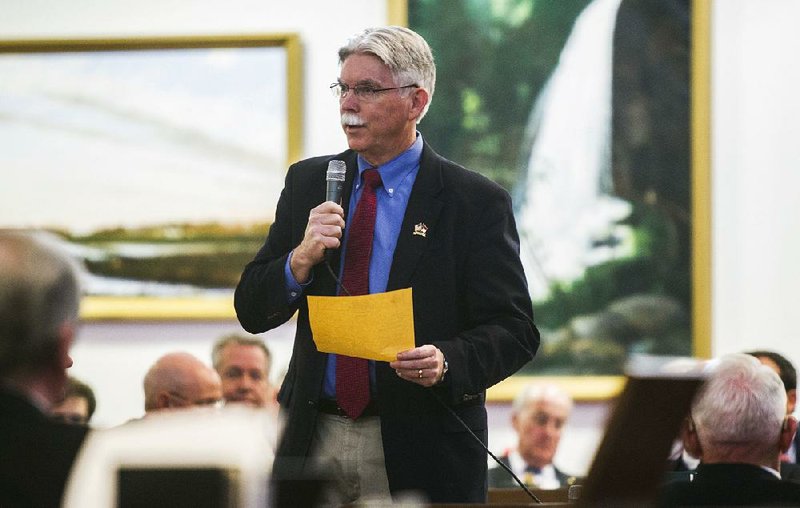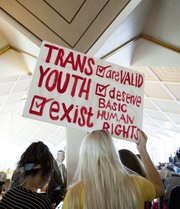RALEIGH, N.C. -- A bipartisan deal to kill the North Carolina law known as the "bathroom bill" fell apart Wednesday night.
The law limits protections for lesbian, gay, bisexual and transgender (LGBT) people and was best known for a provision that requires transgender people to use public restrooms corresponding to the gender on their birth certificates. It was passed earlier this year after Charlotte officials approved an anti-discrimination ordinance.
The repeal compromise touted by both Democratic Gov.-elect Roy Cooper and GOP Gov. Pat McCrory called for Charlotte to do away with its ordinance. In exchange, lawmakers would undo the LGBT law.
But both sides balked: GOP lawmakers cried foul when Charlotte leaders initially left part of the city's ordinance in place. Council leaders met Wednesday morning -- an hour before the special session began -- to repeal other portions of the February ordinance, "to ensure the repeal of [HB2] would not be jeopardized in any way," the city said in a statement.
But when a Senate bill called for a six-month ban on cities passing similar ordinances, Democrats said Republicans were going back on their promise. The moratorium was modified to last until a month after legislators finished their annual session in 2017, which likely would mean August or later.
"This wasn't the deal," said Sen. Jeff Jackson, a Charlotte Democrat. "This bill breaks this deal. Charlotte would have not repealed its ordinance if this was the deal."
GOP Senate leader Phil Berger, the repeal bill's primary sponsor, said the delay would give lawmakers time in 2017 to find a long-range solution to address issues that led to Charlotte's ordinance and House Bill 2.
"It gives everyone an opportunity to start over," Berger said. "You don't get those chances very often ... an opportunity for us as a state to get this right.
After the session ended, Berger expressed exasperation at the day's proceedings, telling reporters, "This has been a long and ultimately frustrating day."
He blamed Cooper for sinking the deal. Meanwhile, Senate Minority Leader Dan Blue criticized McCrory for calling the special session a few days before Christmas when there didn't seem to be an agreement.
The measure also did not satisfy gay- and transgender-rights groups, who pledged to continue to fight a state law that they had criticized as one of the most discriminatory in the nation.
"It is unacceptable. It's a gimmick. It's HB 2.0," said Mara Keisling, president of the National Center for Transgender Equality. "It's not OK and any legislature that would do that wouldn't really be doing that for only six months."
The head of the Human Rights Campaign echoed that sentiment on Twitter, saying that Berger's bill "doubles-down on discrimination."
Social conservatives were thrilled with the preservation of the bill. North Carolina Values Coalition executive director Tami Fitzgerald praised lawmakers "who stood up for what is right and represented the will of voters by stopping the move to cower and cave-in to the City of Charlotte and the Human Rights Campaign."
Such groups said the measure provides privacy and protection for children using restrooms and locker rooms.
Lawmakers have worked "hard to protect our families, and women and children from the risk that might be imposed by these lunatic ordinances that the lunatic left in Charlotte and other places want to enact," said Republican Sen. Buck Newton, who championed the bill when it was passed in March and supported it ever since.
The U.S. Justice Department and others contend the threat of sexual predators posing as transgender persons to enter a bathroom is practically nonexistent.
"This was a counterproductive exercise in reaffirming to the rest of the country that North Carolina wants to remain mired in this divisive dispute," said Simone Bell, Southern regional director at Lambda Legal, a gay- and transgender-rights group.
HB2 has been blasted by LGBT-rights groups and resulted in conventions, jobs and sporting events like the NBA All-Star Game shunning North Carolina. Corporate critics of the law included Deutsche Bank and Paypal, which both backed out of projects that would have brought hundreds of jobs to the state.
Cooper made HB2 a key issue in his campaign against McCrory, saying he wanted it repealed and blamed McCrory for hurting the state's brand as a business destination. Cooper won by about 10,000 votes. McCrory conceded just two weeks ago after the vote count went into overtime.
Cooper said earlier this week that Berger and House Speaker Tim Moore had assured him that Charlotte's vote to repeal its ordinance would lead to a full repeal. He had lobbied Charlotte's City Council to gut its nondiscrimination ordinance.
"The Legislature had a chance to do the right thing for North Carolina, and they failed," he said Wednesday night. "This was our best chance. It cannot be our last chance."
Information for this article was contributed by Gary D. Robertson and Emery P. Dalesio of The Associated Press and by Mark Berman and Sandhya Somashekhar of The Washington Post.
A Section on 12/22/2016

